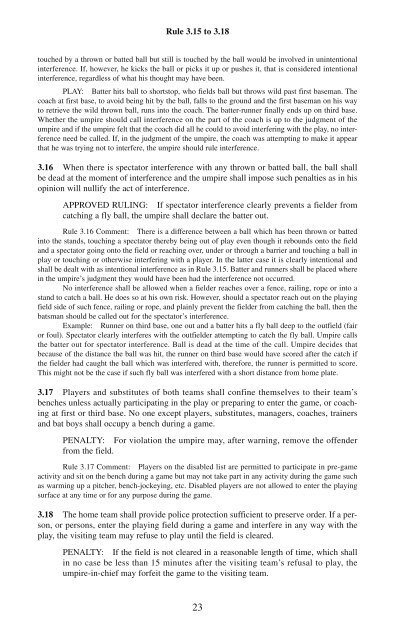OFFICIAL BASEBALL RULES
1SPD1Aq
1SPD1Aq
You also want an ePaper? Increase the reach of your titles
YUMPU automatically turns print PDFs into web optimized ePapers that Google loves.
Rule 3.15 to 3.18touched by a thrown or batted ball but still is touched by the ball would be involved in unintentionalinterference. If, however, he kicks the ball or picks it up or pushes it, that is considered intentionalinterference, regardless of what his thought may have been.PLAY: Batter hits ball to shortstop, who fields ball but throws wild past first baseman. Thecoach at first base, to avoid being hit by the ball, falls to the ground and the first baseman on his wayto retrieve the wild thrown ball, runs into the coach. The batter-runner finally ends up on third base.Whether the umpire should call interference on the part of the coach is up to the judgment of theumpire and if the umpire felt that the coach did all he could to avoid interfering with the play, no interferenceneed be called. If, in the judgment of the umpire, the coach was attempting to make it appearthat he was trying not to interfere, the umpire should rule interference.3.16 When there is spectator interference with any thrown or batted ball, the ball shallbe dead at the moment of interference and the umpire shall impose such penalties as in hisopinion will nullify the act of interference.APPROVED RULING: If spectator interference clearly prevents a fielder fromcatching a fly ball, the umpire shall declare the batter out.Rule 3.16 Comment: There is a difference between a ball which has been thrown or battedinto the stands, touching a spectator thereby being out of play even though it rebounds onto the fieldand a spectator going onto the field or reaching over, under or through a barrier and touching a ball inplay or touching or otherwise interfering with a player. In the latter case it is clearly intentional andshall be dealt with as intentional interference as in Rule 3.15. Batter and runners shall be placed wherein the umpire’s judgment they would have been had the interference not occurred.No interference shall be allowed when a fielder reaches over a fence, railing, rope or into astand to catch a ball. He does so at his own risk. However, should a spectator reach out on the playingfield side of such fence, railing or rope, and plainly prevent the fielder from catching the ball, then thebatsman should be called out for the spectator’s interference.Example: Runner on third base, one out and a batter hits a fly ball deep to the outfield (fairor foul). Spectator clearly interferes with the outfielder attempting to catch the fly ball. Umpire callsthe batter out for spectator interference. Ball is dead at the time of the call. Umpire decides thatbecause of the distance the ball was hit, the runner on third base would have scored after the catch ifthe fielder had caught the ball which was interfered with, therefore, the runner is permitted to score.This might not be the case if such fly ball was interfered with a short distance from home plate.3.17 Players and substitutes of both teams shall confine themselves to their team’sbenches unless actually participating in the play or preparing to enter the game, or coachingat first or third base. No one except players, substitutes, managers, coaches, trainersand bat boys shall occupy a bench during a game.PENALTY: For violation the umpire may, after warning, remove the offenderfrom the field.Rule 3.17 Comment: Players on the disabled list are permitted to participate in pre-gameactivity and sit on the bench during a game but may not take part in any activity during the game suchas warming up a pitcher, bench-jockeying, etc. Disabled players are not allowed to enter the playingsurface at any time or for any purpose during the game.3.18 The home team shall provide police protection sufficient to preserve order. If a person,or persons, enter the playing field during a game and interfere in any way with theplay, the visiting team may refuse to play until the field is cleared.PENALTY: If the field is not cleared in a reasonable length of time, which shallin no case be less than 15 minutes after the visiting team’s refusal to play, theumpire-in-chief may forfeit the game to the visiting team.23


